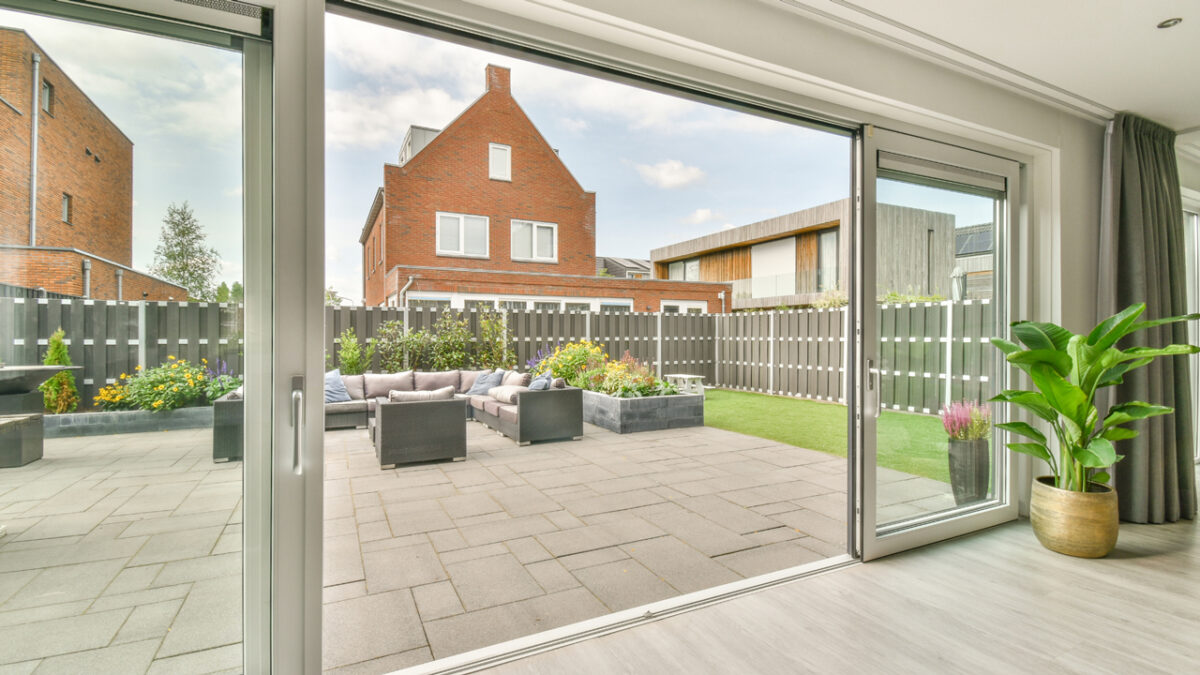Over time, dirt, debris, and even rust can accumulate in the tracks, impeding the smooth movement of the sliding glass door. To resolve this, it’s essential to conduct a thorough cleaning. Use a soft brush and warm, soapy water to remove any accumulated grime.
If you encounter issues beyond what regular cleaning can address, explore our detailed guide on how to fix sliding glass door issues. If the tracks are visibly damaged or corroded, replacement might be necessary for optimal functionality.
Misaligned Rollers
Misalignment is a common issue that occurs with regular use. If the rollers are not properly aligned with the track, the door can rub against the frame, causing difficulty in sliding.
Adjusting the rollers is a straightforward solution. Loosen the screws on the roller brackets and gently align the rollers with the track. Tighten the screws once alignment is achieved.
Worn or Damaged Rollers
Rollers bear the brunt of the sliding door’s weight and can wear out over time. If the door sticks or wobbles, worn or damaged rollers could be the culprit. Replacing these rollers is essential for restoring smooth operation. Fortunately, replacement rollers are widely available and can be fitted with minimal effort.
Drafty Door
Damaged Seal, Misaligned Door, or Warped Frame
A drafty sliding glass door can compromise energy efficiency. Inspect the door’s seal for any signs of damage, as a worn-out seal can allow air leaks.
Replace the seal if necessary. Misaligned doors or warped frames can also contribute to drafts. Adjust the door alignment or consider repairing/replacing the frame to ensure a snug fit.
Noisy Door
Dirty or Damaged Tracks
A door that makes noise during operation is often a result of dirt or damage in the tracks. Thoroughly cleaning the tracks with a soft brush and warm, soapy water can eliminate the source of the noise.
Regular maintenance, including cleaning, prevents the build-up of debris that could lead to operational issues.
Misaligned Rollers
Misaligned rollers can create noise as they move along the track. A simple adjustment involves loosening the screws on the roller brackets, aligning the rollers with the track, and securing them in place. This minor tweak can significantly reduce or eliminate unwanted noise.\
Worn or Damaged Rollers
Worn or damaged rollers can produce grinding or scraping noises. In such cases, replacing the worn-out or damaged rollers is the recommended solution. New rollers ensure smooth and quiet door operation.
Door Not Closing Properly
Obstruction in the Track
An obstruction in the track can prevent the door from closing properly. Regularly check for and remove any debris or foreign objects that might impede the door’s movement. Clearing the track ensures unobstructed door operation.
Damaged or Misaligned Strike Plate
The strike plate, the metal component where the latch catches when the door is closed, can become damaged or misaligned. If the door isn’t closing properly, inspect the strike plate for issues. Adjust or replace the strike plate as needed to facilitate correct door closure.
Warped Door or Frame
Warped doors or frames can be a more complex issue. Professional repair or replacement may be necessary if warping is affecting the door’s ability to close correctly.
Water Damage
Damaged Seal or Frame
Water damage can compromise the structural integrity of a sliding glass door. A common culprit is a damaged or worn-out seal. If the seal is cracked or degraded, it won’t effectively prevent water infiltration.
Regularly inspect the seal for signs of wear and tear, and replace it promptly if needed. Additionally, examine the frame for any visible damage, as cracks or gaps can allow water to seep in.
Loose Screws and Hardware Issues
Wear and Tear
Over time, the screws and hardware holding the sliding glass door in place can loosen due to constant use and environmental factors. This can lead to wobbling, misalignment, or difficulty in operation. Tightening loose screws and inspecting hardware regularly is a simple yet effective preventive measure.
Preventive Maintenance Tips
- Regular Cleaning:
- Clean tracks and rollers regularly with warm, soapy water to remove dirt, debris, and rust buildup.
- Consider using a vacuum cleaner attachment to reach deep into the tracks for a thorough cleaning.
- Lubrication:
- Apply a silicone-based spray lubricant to the rollers. This helps to keep them moving smoothly and minimizes friction, reducing wear and tear.
- Visual Inspection:
- Periodically inspect the door, tracks, rollers, seals, and frame for signs of damage, wear, or rust.
- Check for any loose screws or hardware that may need tightening or replacement.
- Avoid Harsh Chemicals:
- Refrain from using harsh chemicals or abrasive cleaners on your sliding glass door, as these can damage the materials.
- Gentle Handling:
- Open and close the door smoothly. Avoid slamming it shut, as rough handling can stress components and lead to premature wear.
- Seasonal Adjustments:
- In extreme weather conditions, such as very hot or cold temperatures, the materials in your sliding glass door may expand or contract slightly.
- It may be necessary to adjust the rollers or strike plate seasonally to ensure the door continues to function properly.
Embrace the Ease of Living with Euroline Steel Windows & Doors
Our commitment to excellence ensures not just cutting-edge aesthetics but also enduring functionality. Elevate your living spaces with our high-quality sliding glass doors, expertly crafted to stand the test of time.
When issues arise, trust our professional repair and replacement services to swiftly restore your door’s optimal performance. Security, energy efficiency, and style converge seamlessly in our architectural solutions.
For a seamless experience, explore our comprehensive guide on how to fix sliding glass door issues, choose Euroline Steel Windows & Doors—where innovation meets reliability. For inquiries or services, contact us at 877-590-274. Let Euroline redefine your living experience.

